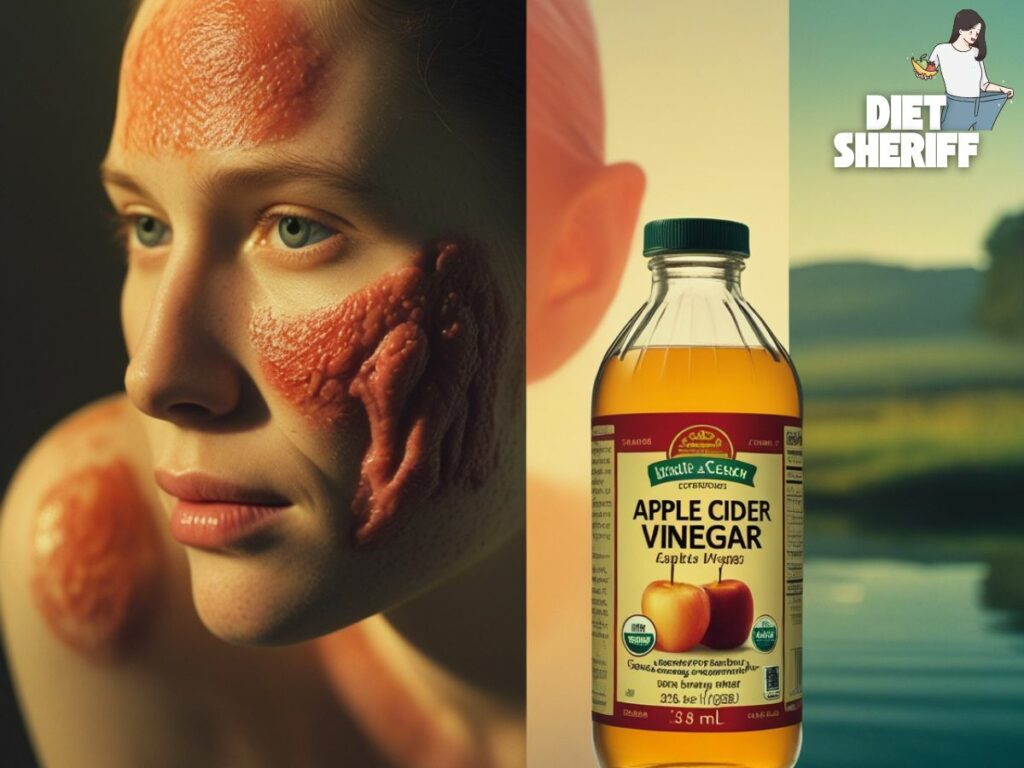Eczema is a chronic skin condition that is characterized by dry, itchy, and inflamed skin. It affects millions of people worldwide.
Many people seek natural remedies to manage their symptoms. This is why apple cider vinegar often comes up as a popular option.
Now there’s a pressing question: Can apple cider vinegar make eczema worse? It shows some remedies for eczema but for people, it depends on how it reacts.
This article delves into the potential benefits and risks of using ACV for eczema and offers guidance on its safe use.

Key Takeaway
Experts Guide
Apple Cider Vinegar: A Natural Remedy for Eczema?
Apple cider vinegar is a type of vinegar made from fermented apple juice. It’s rich in acetic acid, vitamins, and minerals, and has been used for centuries as a natural remedy for various ailments with dietsheriff.
In recent years, ACV has gained popularity for its potential benefits in treating skin conditions, including eczema.

How Does Apple Cider Vinegar Works?
Related Articles: Which Apple Cider Vinegar for Weight Loss?
Here’s why some people believe it may help:
- Antimicrobial Properties: ACV has natural antibacterial and antifungal properties. It helps prevent infections in eczema-prone skin. By keeping the skin free from harmful bacteria and fungi, ACV may reduce the risk of secondary infections that can exacerbate eczema symptoms.
- Restoration of Skin pH: Healthy skin typically has a slightly acidic pH. It helps protect it from harmful bacteria and maintain its barrier function. Eczema-prone skin has a higher pH. It weakens the skin barrier and leads to flare-ups. ACV’s acidic nature may help restore the skin’s natural pH balance. This potentially improves barrier function and reduces symptoms.
- Anti-Inflammatory Effects: Apple Cider Vinegar has anti-inflammatory properties that may help soothe the inflammation associated with eczema. This could potentially reduce redness, swelling, and itching.
Related Articles: How Does Apple Cider Vinegar Works?
https://gigasecurehome.com/amazon-ring-doorbell-not-charging
Can Apple Cider Vinegar Make Eczema Worse?
ACV has potential benefits but it has some risks associated with sensitive skin conditions.
Here’s how ACV might make eczema worse:
- Skin Irritation: One of the most significant risks of using ACV on eczema-prone skin is irritation. The acetic acid in ACV can be too harsh for sensitive skin. It leads to burning, stinging, or worsening of eczema symptoms. This is especially true if ACV is applied undiluted or left on the skin for too long.
- Allergic Reactions: Some people can be allergic to apple cider vinegar or its components. When you apply ACV to the skin, it can trigger an allergic reaction, leading to redness, swelling, and increased itching. This reaction can further aggravate eczema and cause discomfort.
- Disruption of the Skin Barrier: ACV helps restore the skin’s pH balance. Its acidic nature disrupts the skin barrier if used improperly. A compromised skin barrier can make eczema worse if you apply ACV directly to it.
Related Articles: What Are Apple Cider Vinegar Supplements Good For?
How to Use Apple Cider Vinegar for Eczema Safely
If you’re considering using apple cider vinegar as a treatment for eczema, it’s crucial to do so with caution.

Here are some tips to minimize the risks and potentially reap the benefits:
- Always Dilute ACV: Never apply undiluted apple cider vinegar directly to the skin, as it can cause irritation or burns. A common dilution ratio is 1 part ACV to 3 parts water. This helps reduce the risk of irritation while still providing the potential benefits.
- Patch Test First: Before applying ACV to a larger area, perform a patch test on a small, unaffected part of your skin. Apply the diluted ACV solution and wait 24 hours to see if any irritation occurs. If your skin reacts negatively, it’s best to avoid using ACV altogether.
- Use It Sparingly: Even if your skin tolerates ACV, use it sparingly. Overuse can lead to irritation and a compromised skin barrier. Consider using ACV no more than once a day and monitor your skin’s reaction closely.
- Consult a Dermatologist: If you’re unsure about using apple cider vinegar for eczema, it’s always best to consult a dermatologist. They can provide personalized advice based on your skin type and the severity of your eczema.
Related Articles: Does Apple Cider Vinegar Make You Gassy?
https://gigasecurehome.com/why-is-google-nest-not-working
Alternative Natural Remedies for Eczema
If apple cider vinegar isn’t suitable for your skin, other natural remedies may help manage eczema symptoms.

These don’t have any risk associated with ACV:
- Coconut Oil: Coconut oil has moisturizing and anti-inflammatory properties that can help soothe dry, itchy skin. It’s gentle enough for most people with eczema and can be applied directly to affected areas.
- Oatmeal Baths: Colloidal oatmeal is known for its soothing and anti-inflammatory effects. Adding finely ground oatmeal to a lukewarm bath can help relieve itching and reduce inflammation.
- Aloe Vera: Aloe vera is a natural moisturizer with anti-inflammatory properties. If you apply aloe vera gel to eczema-prone skin, it will help hydrate and soothe irritated areas.
- Honey: Honey has antimicrobial and anti-inflammatory properties. It makes it a gentle option for eczema care. If you apply a thin layer of raw honey to affected areas, it helps reduce redness and prevent infection.
https://gigasecurehome.com/google-nest-not-connecting-to-wi-fi-common
When to Avoid Apple Cider Vinegar for Eczema
There are certain situations where it’s best to avoid using apple cider vinegar for eczema altogether.

If your eczema is severe, with open sores, oozing, or widespread inflammation, ACV may be too harsh for your skin.
In such cases, it’s important to seek medical advice before trying any new treatments.
If you have extremely sensitive skin, ACV is more likely to cause irritation and exacerbate your symptoms diet sheriff.
Consider using gentler natural remedies or prescribed treatments instead. If you’ve had an allergic reaction to apple cider vinegar in the past, avoid using ACV for eczema.
Explore Also:
Creativehouseblog
Gigasecurehome
Mycleanseplan
FAQs Of Can Apple Cider Vinegar Make Eczema Worse?
How often can I use apple cider vinegar for eczema?
If your skin tolerates apple cider vinegar well, you can use it once a day. However, it’s important to monitor your skin’s response and discontinue use if you notice any signs of irritation.
Are there any alternatives to apple cider vinegar for treating eczema?
Yes, several other natural remedies may be gentler on the skin than apple cider vinegar. These include coconut oil, oatmeal baths, aloe vera, honey, and calendula cream.
Is it safe to use apple cider vinegar on children with eczema?
Children’s skin is generally more sensitive than adults’, so it’s important to be cautious when using apple cider vinegar on a child with eczema. Always dilute the ACV and perform a patch test first.
Can apple cider vinegar irritate eczema?
Yes, apple cider vinegar (ACV) can irritate eczema-prone skin, especially if used undiluted. The acetic acid in ACV is strong and can cause burning, stinging, or increased redness in sensitive skin.






